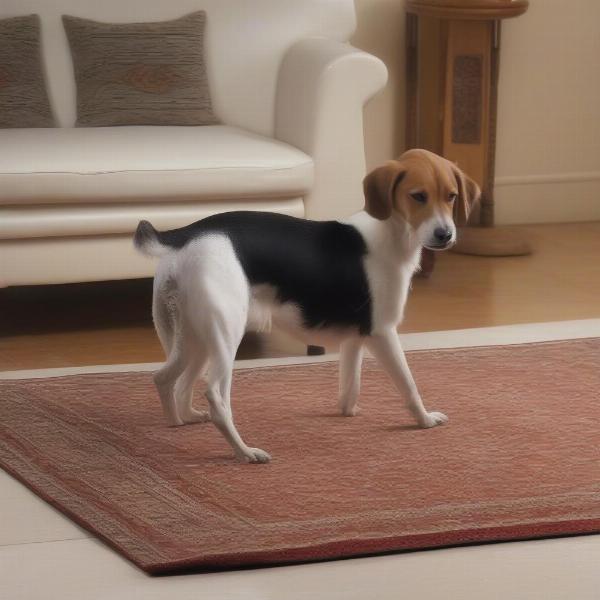Anti dog spray for peeing is a common search term for pet owners struggling with inappropriate urination. This guide will explore the reasons behind this behavior, offer effective alternatives to deterrent sprays, and provide a holistic approach to resolving this frustrating issue.
Understanding Why Dogs Pee Inappropriately
Before reaching for anti dog spray for peeing, it’s crucial to understand the underlying cause. Is it a medical issue, a behavioral problem, or simply a lack of proper training? Medical conditions like urinary tract infections, bladder stones, or even cognitive decline can lead to accidents. Behavioral issues such as anxiety, territorial marking, or submissive urination can also contribute to the problem. Finally, insufficient housetraining or changes in the dog’s environment can trigger inappropriate peeing.
 Dog peeing indoors: Reasons
Dog peeing indoors: Reasons
Alternatives to Anti Dog Spray for Peeing
While some anti dog spray for peeing products claim to deter the behavior, they can often be ineffective and even harmful. The strong scents can be stressful for dogs, potentially worsening underlying anxiety issues. Instead of relying on these sprays, consider more humane and effective alternatives.
Positive Reinforcement and Consistent Housetraining
Reinforcing desired behavior through positive reinforcement methods, such as treats and praise, is a far more effective long-term solution. Consistent housetraining, even for adult dogs, is key. Establish a regular potty break schedule and reward your dog immediately after they eliminate in the designated area.
Addressing Medical Concerns
If you suspect a medical issue, consult your veterinarian. They can diagnose any underlying conditions and recommend appropriate treatment. Ignoring medical problems can exacerbate the issue and lead to further complications.
Managing Anxiety and Behavioral Issues
If anxiety or other behavioral issues are contributing to the problem, consider consulting a certified dog trainer or veterinary behaviorist. They can help you identify triggers and implement behavior modification techniques to address the root cause. Creating a safe and predictable environment for your dog can also significantly reduce anxiety-related accidents.
Creating a Pee-Free Environment
Enzymatic cleaners are essential for eliminating urine odors that can attract dogs back to the same spot. Thoroughly clean any areas where your dog has urinated previously. Restricting access to certain areas of your home, especially during initial training, can also prevent accidents.
Addressing Specific Situations: Marking and Submissive Urination
Territorial marking often involves small amounts of urine sprayed on vertical surfaces. Neutering or spaying can help reduce this behavior. Submissive urination, characterized by dribbling urine when the dog is greeted or feels intimidated, requires gentle and positive interactions to build confidence. Avoid scolding or punishing the dog, as this can worsen the problem.
Conclusion
Addressing inappropriate urination requires a holistic approach. Rather than relying on anti dog spray for peeing, focus on understanding the root cause and implementing positive reinforcement, consistent housetraining, and addressing any underlying medical or behavioral issues. Creating a supportive and predictable environment will help your dog feel secure and eliminate accidents, fostering a happier and healthier relationship between you and your furry friend.
FAQ
-
Why is my dog suddenly peeing inside? Sudden changes in behavior can be due to medical issues, stress, or changes in routine. Consult your vet to rule out medical problems.
-
How can I stop my dog from marking territory indoors? Neutering/spaying, enzymatic cleaners, and behavior modification can help address marking behavior.
-
Is anti dog spray for peeing harmful? While not always harmful, deterrent sprays can be stressful and ineffective. Positive reinforcement methods are generally preferred.
-
What is submissive urination? Submissive urination is involuntary dribbling of urine due to fear or anxiety, often seen in puppies or shy dogs.
-
How often should I take my dog out to pee? Puppies and older dogs may need more frequent potty breaks. A general guideline is every 2-4 hours, depending on age and individual needs.
-
What are the best cleaning products for dog urine? Enzymatic cleaners are specifically designed to break down urine and eliminate odors.
-
When should I consult a veterinarian about my dog’s peeing issues? If the problem persists despite training efforts or if you notice other symptoms like straining or blood in the urine, consult your vet immediately.
ILM Dog: Your Trusted Partner in Dog Care
ILM Dog is a leading international dog care website dedicated to providing expert advice and resources for dog owners worldwide. From breed selection and health care to training, nutrition, and grooming, we offer a comprehensive range of information to help you provide the best possible care for your canine companion. Whether you’re a new dog owner or a seasoned expert, ILM Dog is your go-to source for reliable and practical information. Contact us for expert advice: Email: [email protected], Phone: +44 20-3965-8624.